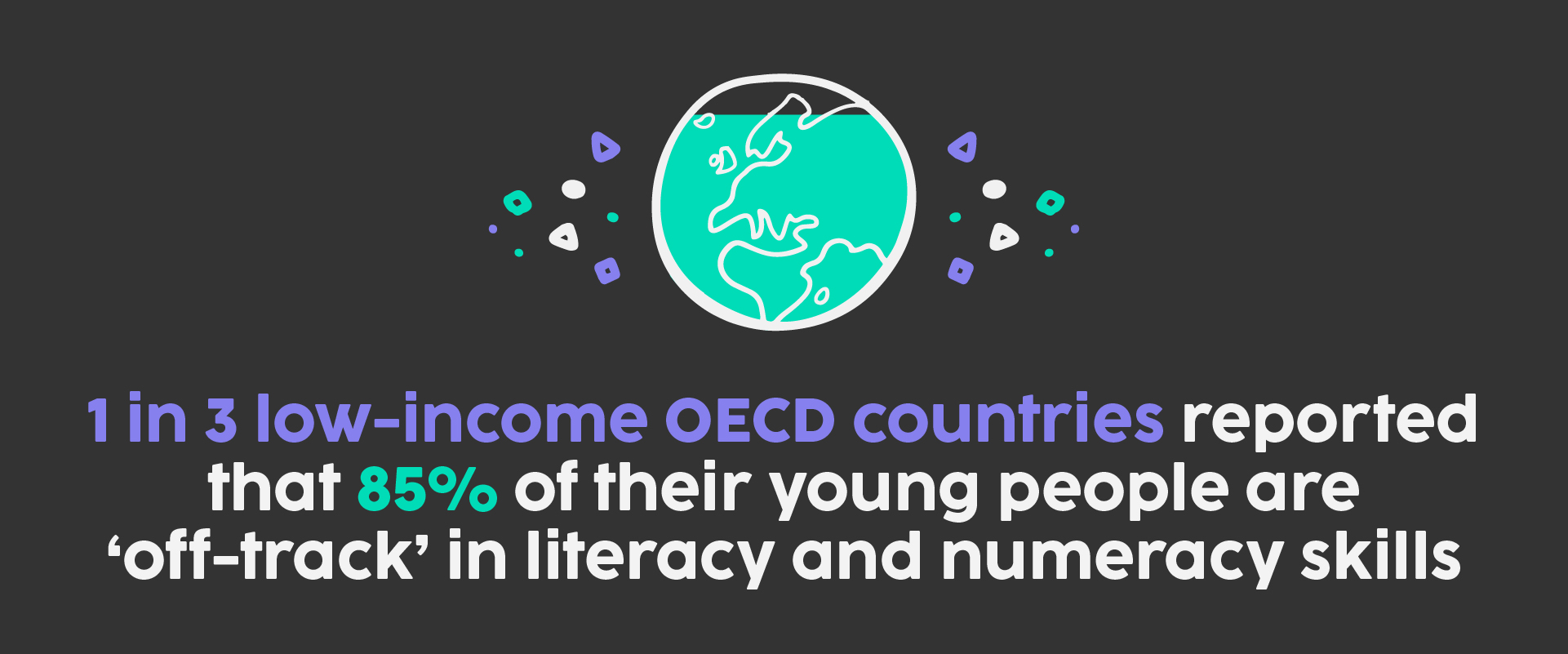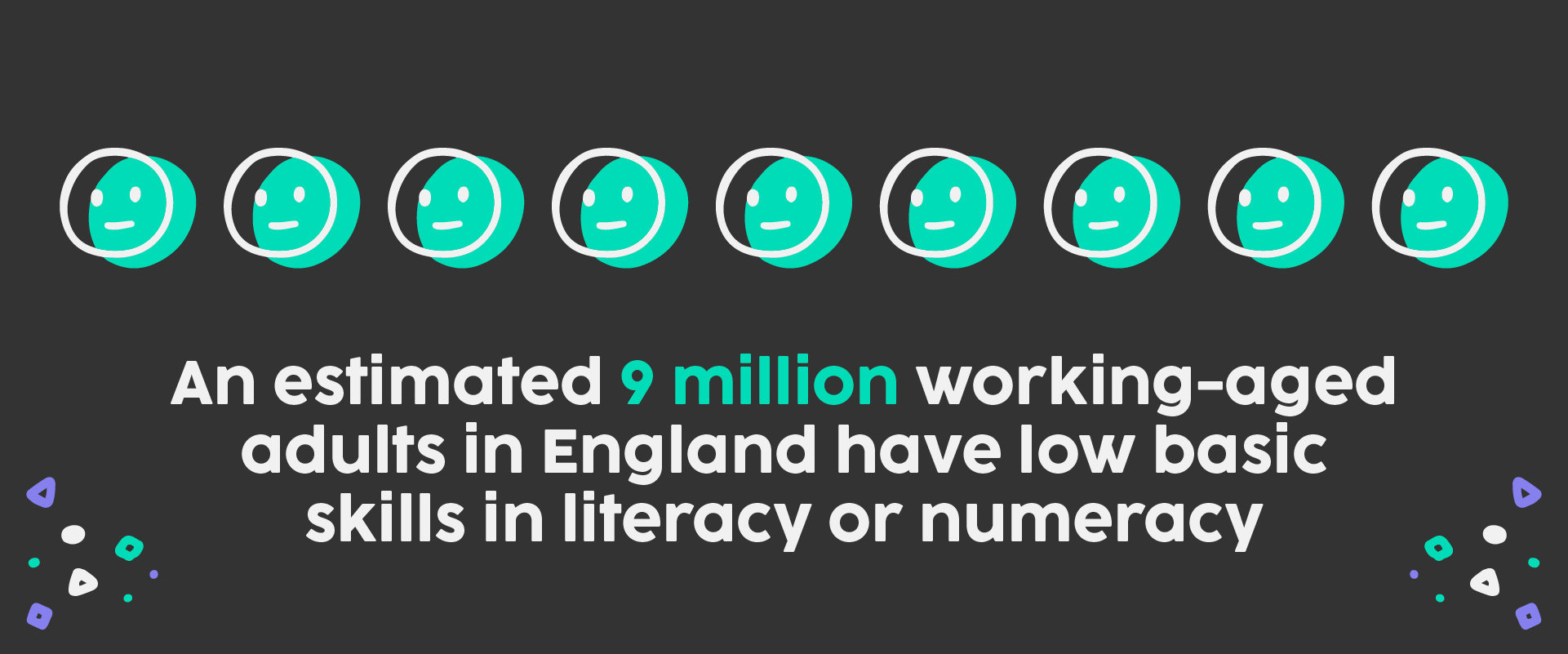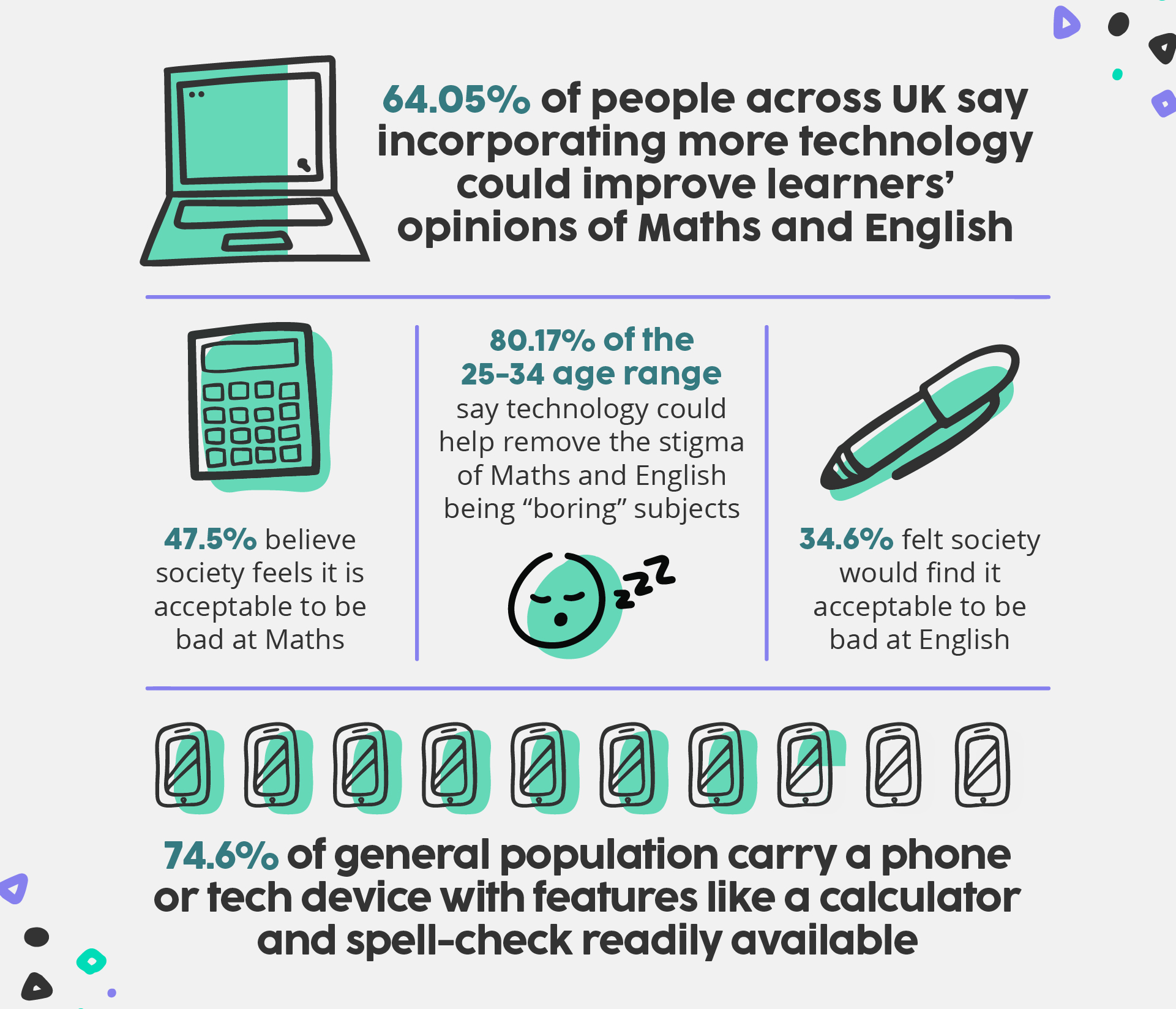How Technology Can Enhance Maths and English Skills
Details: Written by Kelly Worsnop
|
Published:

In 2021, the Learning and Work Institute reported that 1 in 5 adults across England had low English and/or Maths skills, equating to 9 million people. Fast forward to 2023, we have seen the introduction of a £559 million pound government incentive to address the UK’s flat-lining maths skills. For a country of great wealth and one of the oldest education systems in the history of the world, the UK’s engagement with functional skills is plummeting, with a 60% drop in the number of adults completing their English and Maths studies since 2012. If the UK continues to follow this trajectory, it has been reported that the UK could fall 4 places in global literacy tables and 3 places in numeracy tables by 2030. This short blog piece will share some key insight from our Maths and English Trend Report and will ultimately determine that technology plays a crucial role in re-engaging adults and reshaping Maths and English education across the UK.
Education Rankings by Country: how does the UK measure up?
Education rankings by country are complex assessments that reflect a nation's commitment to providing quality education.
Now we know what you’re thinking…
Which Country has the Best Education System?
Finland consistently stands out as a global leader in education rankings due to its:
- Student-focussed approach
- Highly qualified teachers
- Emphasis on nurturing creativity and individuality.
The Finnish education system prioritises play-based learning in early childhood, allowing children to develop holistically before entering formal schooling.
Similarly, Singapore and South Korea are known for their strong performance in standardised tests, indicating a focus on rigorous academic training.
Singapore's success can be attributed to its:
- Well-structured curriculum
- Supportive learning environments
- Effective teacher training programs

South Korea's impressive Organisation for Economic Cooperation and Development (OECD) scores are a result of its intense dedication to education, long study hours, and a culture that values academic achievement.
However, education rankings within the OECD report are not solely based on the top-performing OECD countries.
Developing nations often face unique challenges in providing equal access to education, particularly in remote and impoverished areas.
These countries might struggle with:
According to the World Population Review, developed nations almost always have an adult literacy rate of 96% or better. In contrast, the least developed nations manage an average literacy rate of only 65%.
The UNICEF Recovering Learning Report 2021 added that:

As a result, their OECD statistics and rankings may be lower compared to more developed and resource-rich nations.
So where does the UK fit into all this?
Despite the UK having one of the most highly regarded and oldest education systems in the world and ranking 12th on the Prosperity Index in 2023. England is 15th out of 31 OECD countries in literacy skills and 19th in numeracy skills according to recent Learning and Work Institute reports.
Read more about The History of Education
With this in mind, OECD growth forecasts anticipate that if the UK does not re-engage its students and adults with core functional skills such as Maths and English, it will continue to drag its feet when it comes to UK literacy rates and basic maths skills among adults.
This not-so-sunny forecast is backed up with evidence from the 2023 Global World Skills Report. For the fifth consecutive year, the Global Skills Report shows a concerning trend for the UK, as it has been experiencing a decline in general skills proficiency. In 2022, the UK's global ranking dropped to 38th place.
This starkly contrasts eight European countries that secured spots in the top 10 globally performing nations. This situation confirms the urgent need for the UK to revamp its skilling strategies - including functional skills.
According to the Program for the International Assessment of Adult Competencies (PIAAC)- a survey that runs every 10 years:

The real-life and day-to-day impact of poor functional skills in the UK can be as fundamental as
- not knowing how to estimate how much petrol is left in the tank from the sight of the gauge
- understanding the instructions on a box or bottle of medication
The UK and its population are being left behind on a global scale when it comes to functional skills.
This is where our Maths and English Trend Report comes in.
Download your free copy of our Maths and English Trend Report 2023
Maths and English Skills in the UK: how can technology help?
As one of the UK’s leading online learning providers, we feel we are uniquely positioned to help the sector and decision-makers in Government understand the issues surrounding the UK’s dysfunctional relationship with functional skills.
We work to upskill over 35,000 learners in the UK each year; we work with 5,000 organisations across a variety of sectors; we partner with over 500 colleges and independent learning providers; and over the last decade, we have helped over 1.6 million learners through our bespoke online learning portal EQUAL.
At the heart of our latest research report, you will find ground-breaking learner insights and unique research to inform thinking and harness the possibilities and potential that modern technology can bring, helping to break down barriers and re-engage the nation with functional skills.
Our CEO Mark Dawe shared:
“The Covid pandemic showed how technology could assist with helping people access information and education like never before. We feel it’s important that we take advantage of these great strides forward to open up opportunities that before were closed to large parts of society, rather than going back to restrictive learning styles that often didn’t meet the needs of many.”
“This report will look into that issue and see whether the British public feels more able to access online information and how they would like to see online learning look like in the future.”
Our research asked 2000 people across a variety of ages, locations and backgrounds about their experiences from attending UK schools. We wanted to understand their experiences and challenges, and how that affected their views and opportunities in later life.
Not only will the report explore the benefits of technology in education, but it will also reveal deep cultural assumptions and anxieties surrounding the topic of Maths and English Skills.
Here is a full overview of what you can expect to learn about in our latest report:
- Who undertook our survey?
- Experience of Maths and English at School
- Maths and English ability as an adult
- Qualifications in Maths and English
- Qualifications for first job
- Qualifications in Maths and English
- Prepared for real-life demands?
- The role of technology in everyday life
- Maths and English ability and role of schools
- Future use of technology in learning
So, what were the key findings of the Trend Report?
Out of the 30 questions we asked, we can see that there is a clear view that technology and online learning could improve both opinions of Maths and English, remove the stigma and help learning.
64.05% of people who responded, said that they believed that incorporating more technology could improve students’ opinions of these subjects– helping to tackle the widely held view that these could be ‘boring’ subjects in the classroom.

Recent research by Uswitch on mobile phone ownership in the UK shows that as of 2021, 88% of all adults in the UK had a smartphone. When broken down by age, 96% of those aged 16-24 owned a smartphone device compared to 78% aged 55 and above – meaning there is more capacity for young adults in school and further education to utilise this technology.
Were you surprised by any of this insight? Want to know more?
Get your free copy of our Maths and English Trend Report 2023Functional Skills and Education Technology
The Skills Network has developed a range of resources at different levels to support the development of Maths and English skills across the UK and we want to be a part of transforming learning opportunities and bridging widening the skills gap.
We are proud to offer a wide range of accessible education technology solutions and programmes that will re-invigorate functional skills learning aad engagement for all ages.
Functional Skills:
These programmes are designed for colleges and ITPs to deliver learning opportunities ranging from Entry Level to Level 2 qualifications, and all these courses lead to nationally recognised qualifications. Courses are designed to build confidence, aid career development or help adults get back into work.
For those looking to attend fixed sessions, there are options to study weekly in the classroom or over Zoom. People can also study these courses through Adult Skills Centres or independently online, with learners at home often being able to gain their qualifications more quickly.
Enquire about Functional SkillsMultiply:
These courses help individuals budget to better cope with cost of living pressures and finances – they are available to study online or through Adult Skills Centres. Multiply seeks to address the crucial skills gap, where adult numeracy ranks lower when compared to the national average.
We are proud to work with a number of colleges and educational institutions across the UK, and we wanted to ensure that we reflected some of their experiences within the report.
One of these colleges is Colchester Institute. They have a unique relationship working closely with the local Jobcentre Plus and the National Careers Service in Essex to help adult learners get the support and learning opportunities they need to find employment locally – and this blended approach is seeing positive results, with first-time pass rates in Maths and English improving.
Multiply offers short, flexible learning opportunities of around 6 hours, whilst also improving Maths skills used in everyday life.
Find out more about Multiply
Paul Wakeling, Executive Director of Curriculum, Quality and E-Learning shares:
“As one of the leading Ed Tech companies in the UK, we know that meaningful change has to be focused on a number of fronts, utilising the latest technology to deliver solutions to as wide an audience as is needed, alongside excellent in-person learning where necessary.”
“We need to support schools and education professionals to ensure that from an early age children are able to engage with Maths and English learning in the classroom, tackling any anxieties or stigmas that may arise with the core syllabus to ensure there is no obstruction to learning or to career development later in life.”
We hope our latest trend report will help inform how individual learners and education providers can benefit from accessible, inclusive, and innovative learning experiences, which in turn will help to tackle existing skills shortages, boost the economy and revitalise local communities, which have previously been left behind.
Get your copy of our Maths and English Trend Report 2023Visit our website
If you are an education provider looking to deliver Maths or English functional skills training please do not hesitate to call us on (0)1757 210022